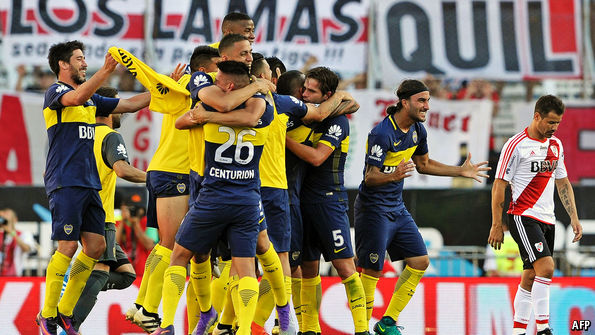Dribbling in the dark
A row over money may disrupt Argentine football
Beautiful game, ugly politics

BUENOS AIRES has 36 stadiums with a capacity of at least 10,000 spectators, more than any other city in the world. Mauricio Macri, Argentina’s president, used his 12 years as president of Boca Juniors, the most popular football club, to launch his political career. He still enjoys a kickabout at the Quinta de Olivos, the presidential residence.
But an ugly row over money is disfiguring the beautiful game. The government owes 350m pesos ($22m) to Argentina’s football association (AFA), which owes the same amount to the country’s football clubs. Many are unable to pay their players. The dispute may delay the restart of the top division’s season, scheduled for February 3rd.
The crisis stems from Mr Macri’s determination to sweep away the populist policies of his predecessor, Cristina Fernández de Kirchner, which extended to football. He is also using the government’s muscle to force reform on a sport notorious for corruption.
Advertisement
|
For years, Argentines without cable television could only watch highlights of weekend fixtures. This amounted to “hijacking the goals until Sunday”, Ms Fernández fumed. Her solution was Fútbol Para Todos, a ten-year deal with the AFA to broadcast on free-to-air television matches played by the national and top-tier teams. The government paid 600m pesos in the first season, more than double what the previous rights-holder paid. Fútbol Para Todos provided around a fifth of the revenues of the top clubs.
Fans loved the arrangement. Ms Fernández’s opponents cried foul. Adverts shown at half-time were often government propaganda. In the election campaign in 2015 Mr Macri promised to keep free footie but drop the adverts. Confronted in office with a massive fiscal deficit and a prospective annual cost for Fútbol Para Todos of 2.5bn pesos, he killed it. The scheme ended last month. The AFA has yet to find a broadcaster for next season.
The threat to this season comes from the unpaid 350m pesos, which Mr Macri is withholding until the AFA cleans itself up. It is still struggling with the legacy of Julio Grondona, who from 1979 until his death in 2014 ruled football “like an emperor”, says Gustavo Abreu of Austral University. The football clubs have yet to agree on a successor. FIFA, the global governing body, established a “normalisation committee” to propose reforms. But progress is slow. FIFA reportedly threatened to ban Argentina from international competitions. Buenos Aires may have a lot of empty stadiums this year.
No comments:
Post a Comment